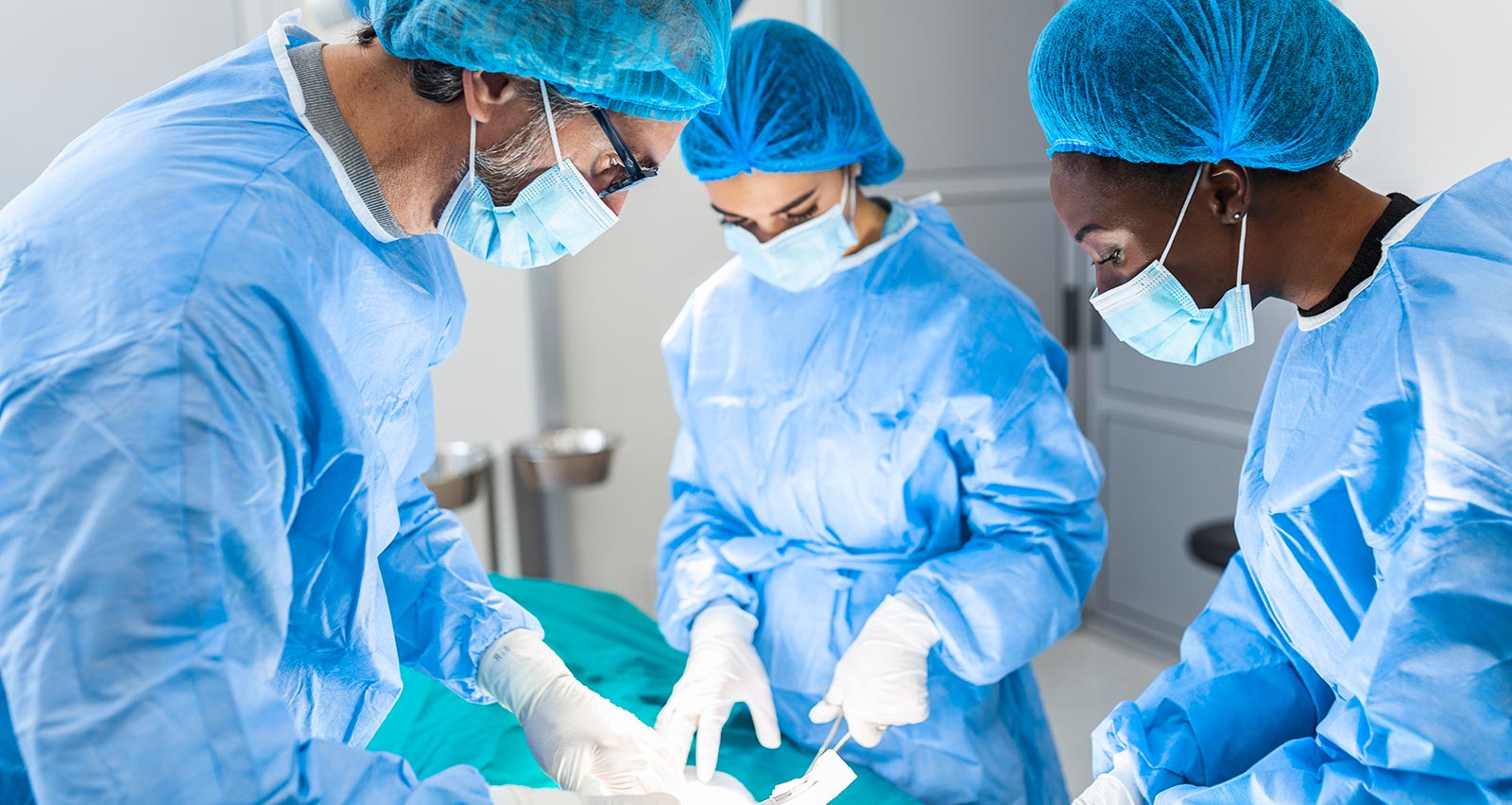
Rapid Deployment Aortic Valve Replacement
Rapid deployment aortic valve replacement (RDAVR), also called sutureless or rapid deployment valve (SRDV), is an alternative to conventional aortic valve replacement. Unlike standard aortic replacement valves, RDAVR valves are implanted using no more than three sutures. RDAVR can significantly reduce operation times and improve outcomes for certain patients.
University Hospitals Harrington Heart & Vascular Institute has extensive experience in one of today’s foremost RDAVR technologies: Perceval sutureless valve replacement.
The aortic valve is one of the four valves that help blood flow in the right direction through the heart’s four chambers. The aortic valve functions as the “door” that connects heart’s left chamber (left ventricle) to the aorta, the main artery that carries oxygenated blood away from the heart to the rest of the body. Due to aging and other factors, your aortic valve may become diseased, preventing it from opening or closing properly.
Your health is important. Get expert care.
Call 216-541-1756.
Find a Cardiac SurgeonWhat Is the Perceval Sutureless Valve?
The Perceval valve is sutureless bovine (cow-based) aortic replacement valve. The valve’s collapsible stent design allows for smaller incisions and easier, faster implantation than other types of aortic valve replacement. Often requiring 20 to 30 sutures, the Perceval valve is implanted without any suturing.
When Is Perceval Sutureless Aortic Valve Replacement Performed?
The Perceval sutureless valve is recommended for patients with severe aortic stenosis, a condition in which the aortic valve leaflets become stiff so that the valve cannot fully open and close. The Perceval valve can also be used to treat aortic valve regurgitation, a condition in which the aortic valve does not close fully, resulting in blood leaking backward into the heart’s left ventricle.
Benefits of Perceval Sutureless Aortic Valve Replacement
Benefits of Perceval sutureless aortic valve replacement include:
- Faster Surgery: Surgery time is substantially reduced because the surgeon does not have to place 20 to 30 sutures around the replacement valve, which improves patient experience.
- Improved Recovery: Reduced surgery time means less stress on the heart. While patients may not necessarily get to go home sooner than they would after having any other type of aortic valve replacement or repair surgery, they may experience easier recoveries and have better long-term outcomes.
- Easier Future Procedures: Compared to transcatheter aortic valve replacement (TAVR) techniques, the Perceval’s stent design provides a better foundation for future procedures if the implanted valve ever needs to be replaced.
- What Happens Before the Perceval Procedure?
-
Prior to the procedure, you will have a physical exam and testing. Your healthcare team comprehensively evaluates your heart and your health to determine the best course of treatment.
Possible tests may include:
- Cardiac catheterization
- Chest X-ray
- Computed tomography (CT) scan
- Echocardiogram (echo)
- Electrocardiogram (EKG)
- Blood tests and urine tests
If you’re approved for the procedure, your care team will share instructions to prepare for surgery, including:
- When you should start fasting prior to your procedure.
- If you should temporarily stop taking any of your medications.
- When to arrive at the hospital.
- Personal items to bring with you and what to leave at home.
- What Happens During the Perceval Procedure?
-
Perceval sutureless aortic valve replacement generally follows these steps:
- You will be given anesthesia to put you in a deep sleep-like state. During the surgery, you will not feel pain or be aware of what’s happening. You will not remember the surgery.
- Unlike open surgery for aortic replacement, which requires the surgeon to open the chest by making a large incision through your breastbone (sternotomy), the Perceval procedure is performed through a smaller chest incision (called an upper partial sternotomy).
- You will be connected to a heart-lung (cardiopulmonary) bypass machine, which allows the surgical team to temporarily and safely stop your heart. The heart-lung machine takes over the function of your heart and lungs during the operation.
- During the procedure, after accessing the aorta through an incision (aortotomy), the surgeon removes the diseased aortic valve flaps (leaflets) and any calcification surrounding the valve.
- The surgeon implants the collapsed Perceval valve into the aorta. Once the valve is in position, a balloon is inflated to expand the valve’s supporting stent, securing it in place.
- What Happens After Rapid Deployment Aortic Valve Replacement?
-
After surgery you will spend a few days in the intensive care unit (ICU), where our medical staff will closely monitor you. After leaving the ICU, you will remain in the hospital for several days.
Patients who receive a Perceval valve are often surprised at how quickly their conditions improve and how soon they are able to return to normal daily activities such as walking, eating and bathing.
- What Are the Risks or Complications of Rapid Deployment Aortic Valve Replacement?
-
Potential risks and complications of Perceval sutureless aortic valve replacement procedure include:
- Abnormal heart rhythm (arrhythmia)
- Paravalvular leakage (blood backing into the heart through the valve)
- Endocarditis (a rare, potentially fatal infection of the heart’s inner lining)
- Valve failure that requires its removal (explantation)
- Stroke
- Death
Age, medical conditions and other factors affect the risk of complications. Your surgeon will discuss your risk factors and what can be done to optimize the success of your surgery.
- Why Choose University Hospitals for RDAVR?
-
Of all the major cardiovascular care centers in the U.S., UH Harrington Heart & Vascular Institute is one of the most active in enrolling patients for rapid deployment aortic valve replacement surgery. Related efforts include a development-stage program called “SAVR Same as TAVR” through which we will promote the use of the Perceval valve in combination with Enhanced Recovery After Surgery (ERAS) protocols. This program will allow patients to be discharged a day or two following minimally invasive aortic valve replacement surgery.
Why Choose University Hospitals for RDAVR?
Unparalleled clinical expertise
Highest quality patient outcomes
Office visits and imaging coordinated on the same day
Quick, convenient access with sites across the region
Virtual appointment option for follow up care

Who Performs RDAVR at University Hospitals?
University Hospitals Harrington Heart & Vascular Institute’s heart surgery program, based at University Hospitals Cleveland Medical Center, in Cleveland, Ohio, is consistently ranked in the top 1 percent of hospitals nationwide.
Find a Cardiac Surgeon Who Performs RDAVRMake an Appointment
For more information, or to schedule an appointment with one of our heart surgeons, call 216-844-4004.
Find a Cardiac SurgeonMANTRA Study
UH Harrington Heart & Vascular Institute’s robust cardiovascular research program includes participation in the MANTRA study, a global clinical study to collect safety and performance data for implantable medical devices for heart valve procedures, including the Perceval sutureless aortic valve.


